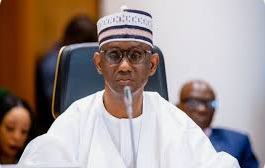LAGOS – Nigerians from critical sectors of the economy have expressed mixed feelings over separate committees set up by organs of the Federal Government to oversee endangered infrastructure now being daily vandalized…CLICK TO READ THE FULL NEWS HERE▶▶
A special team has been set up by the National Security Adviser, Nuhu Ribadu, ostensibly for the protection of critical infrastructure while parallel teams emerged elsewhere in the public sector within a short time to address almost similar issues.
Bishop Herbert Ekechukwu, an economist and cleric, one of those who spoke to Sunday Independent on the issue, maintained that setting up a team for the protection of government properties by National Security Adviser could indeed be an effective measure to address vandalisation of public infrastructure and potential national grid collapse.
Dr Ekechukwu, however, stressed that the team alone cannot solve all the problems, although it will enhance public safety and confidence as well as enhance better interagency coordination.
It would be recalled that Ribadu, a retired Assistant Inspector General of Police and one-time Chairman of the Economic and Financial Crimes Commission (EFCC), had few days ago launched the initiative which he believes would bolster the security of Nigeria’s critical infrastructure amidst rising threats from terrorism, cyber-attacks, and economic sabotage.
The National Grid, for instance, has collapsed for about nine times within this year, a development attributed to terrorism onslaughts, vandalisation and economic sabotage.
This strategic effort was unveiled during the inauguration of the Federal Coordinating Council for the Protection of Critical National Assets and Infrastructure (FCCCNAIP) in Abuja.
The council, chaired by Ribadu, was tasked with securing vital national assets, including energy grids, communication networks, and essential services.
PROTECTION Of NATIONAL ASSETS
Speaking at the inauguration, Ribadu had emphasised the importance of critical infrastructure to national security and economic development.
The team members included Ahmed Audi, Commandant-General of the Nigeria Security and Civil Defence Corps (NSCDC) who would act as its secretary, as well as “heads of security agencies and other relevant stakeholders”.
Olubunmi Tunji-Ojo, Minister of Interior was listed as the Council’s Co-Chairman.
Dr Ekechukwu stated: “There should be collaboration with private security experts. The team should maintain synergy with community policing.
“There should be enhanced physical security measures like CCTV access control as well as remote sensing.
“The following challenges will render such problems ineffective unless these challenges are tackled first. These challenges include funding and resources control, security needs and adequate funding.
“Most times, due to corruption, money meant for projects, is embezzled.
“Secondly, the problem of coordination among multiple agencies. This leads me to the concept of a goat owned by the community, which always dies of hunger because of lack of food.
“There is also the issue of addressing corruption and insider threats. Corruption is like a pin in a bloated balloon. So, corruption issues should be addressed. The council should be on top of the situation before it occurs.”
Also contributing, Dr Rexkennedy Saltlove, a human rights activist, said: “I would like to first commend the government for doing all it can to protect its assets and properties, as damages to them will greatly impact on them negatively, hindering the delivering on the promises for good governance.
“However, like I have always insisted about this government, it is very reactionary. A reactive government can seldom make headway in anything.
“People destroying government properties and ensuring national grid collapse under whatever guise, are expressing their frustration with a failed leadership and systems that have not met up to their expectation in the barest minimum.
“Setting up a ‘protection team’, is addressing the symptom and not the root causes. This will not provide a permanent solution to such.
“Has the government sat down to set up a committee to know what are the immediate and remote causes of vandalisation of government properties and how to address them?
“If such a committee was ever set up and any recommendations were made, what has been the approach and outcome?
Involving the NSA in the issue of internal matters to me, is another means of feeding the boy who recently was shouting on television praising the president and calling him by name that he cannot be defeated…Yet, terrorists from other countries are infiltrating our borders, using different names and leaders that lead the new terror group, like Lakurawa, which the NSA mentioned which is operating in the North West of Nigeria.
“Government should, through the National Orientation Agency (NOA), sensitise the citizens on what patriotism is and the impact of destruction of properties on them.
“But, truth must be told, you can only teach patriotism to citizens who are satisfied and not hungry. And the government should see how that is addressed.”
However, feelers from government quarters indicate singing of discordant tunes and haphazard actions over the protection of infrastructure and the National Grid, as the Federal Government had earlier set up a forensic investigative committee to address the incessant grid collapses, one of the areas the council set up by Ribadu is supposed to address.
Also, Adebayo Adelabu, the Minister of Power, had also constituted another committee after an emergency meeting with the leadership of the Transmission Company of Nigeria (TCN) and the Nigerian Electricity Regulatory Commission (NERC) last Tuesday.
FORENSIC INVESTIGATION COMMITTEE
In a statement by Bolaji Tunji, the minister’s media aide, Adelabu, during the meeting, expressed displeasure over the incident, saying it was “capable of rubbishing the giant strides made in the last one year which had led to an increased generation and distribution of 5,527 megawatts, a record generation in three years.”
He said the forensic investigation committee was mandated to advise the government on necessary solutions to make the national grid robust and reliable.
“The committee is to also establish the root cause of both incidents, especially a review of potential sabotage on the system,” Tunji said.
“The committee will holistically review the national grid stability and identify investments and technical capacities required to make the grid smart and resilient.”
The minister also constituted a six-member technical committee to access the critical nodes on the national grid to identify potential vulnerabilities.
According to Tunji, the committee is to proffer recommendations to address the vulnerabilities to prevent future disruptions to the grid.
The six-member committee is headed by Nafisat Ali, Executive Director of the Independent System Operator (ISO).
Others are “Chidi Ike, commissioner, NERC, Engr. Ishola (GM. National Control Centre (NCC) , Engr. Emmanuel Nosike, Director, Transmission, Federal Ministry of Power (FMoP), Engr. Ali Sharifai (GM, Transmission Service Provider (TSP) and Mr. Adedayo Olowoniyi, Chief Technical Adviser to the Minister of Power.
“The team is expected to present a report to the Hon. Minister by November 1, 2024,” Tunji added.
Yet, in another move, the National Economic Council (NEC), at the weekend, rose from its monthly meeting at the State House, Abuja, with a resolution to reinforce implementation of the National Electrification Strategy in a bid to end the constant collapse of the nation’s power grid.
Accordingly, the council had constituted a13-man Committee on National Electrification to help address the challenges in the power sector.
The formation of the committee was among the decisions taken by NEC at the end of its 146th meeting chaired by Shettima at the Council Chambers.
The committee headed by Cross River State Governor, Bassey Otu, is to work towards deepening states’ engagements within the Electricity Reform Act 2023 and the National Electrification Strategy and Implementation Plan.
Members of the committee included Governors Dikko Radda of Katsina, Inuwa Yahaya of Gombe, Ademola Adeleke of Osun, Hope Uzodimma of Imo, and Caleb Mutfwang of Plateau.
Others were Ministers of Finance, Mr Wale Edun; Budget and Economic Planning, Sen. Atiku Bagudu; Power, Mr Adebayo Adelabu; Special Adviser to the President on NEC and Climate Change; Special Adviser to the President on Power; Managing Director, Rural Electrification Agency (REA), and Managing Director, Niger Delta Power Holding Company.



